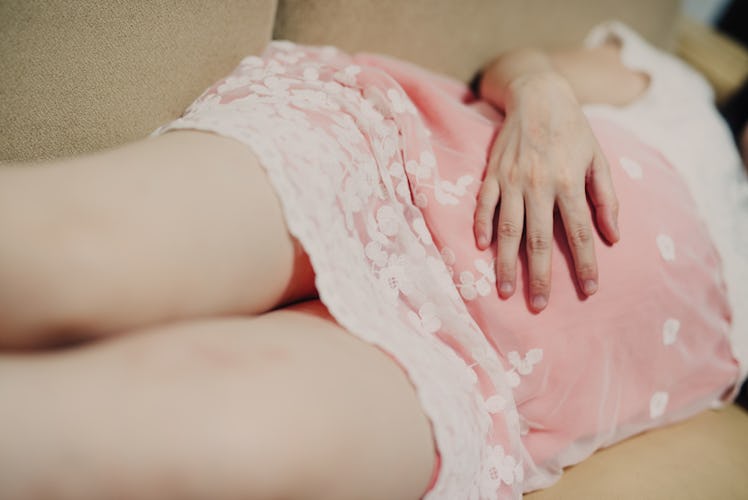
This Is The Age You're Most Likely To Get Pregnant At, So Be Prepared
In case you didn't know, the female body is absolutely incredible. You're born with all of the eggs you will ever need, and then some: 1 to 2 million in total. When you're most fertile, these eggs are at their prime. As you continue to age, your ovaries naturally deteriorate in condition. Even though it is possible to have children well into your late 40s and early 50s, it does get harder, and the risk of genetic abnormalities that could produce birth defects increases.
According to Baby Center, most experts say a woman's fertility reaches its peak in her 20s. These days, having a child in your 20s might mean that you lose momentum in your career and financial goals, though that doesn't happen for everyone. But if you choose to wait until your 30s or 40s to have a child, you might sacrifice some of your fertility for financial security. Additionally, Baby Center reports the risk of miscarriage increases from 10 percent in a woman's 20s to 12 percent in her early 30s, and 18 percent in her late 30s.
Typically, experts caution women against waiting too long past their early 30s to have a child. Women who want to become mothers in their early 40s have a 34 percent chance of a miscarriage, and a 53 percent risk by the time they are 45. Essentially, the younger you are, the easier it is to conceive, because your eggs and your ovaries are healthiest.
However, when deciding when you want to have children, it's important to note that, even though the fertility risk does increase from your late 20s to your early 30s, there isn't that much difference between 10 and 12 percent. In fact, that, and an opportunity to establish their career, could be a possible reason why more and more women are deciding to wait longer to have children. It used to be that the average age of motherhood in the U.S. was 26. In 2016, however, according to the CDC, the birth rate of women having children in their early 30s surpassed those having them in their late 20s.
A possible downside to having a child in your 20s for some women may be that you're forced to reprioritize certain aspects of your life that might've made you feel wholly satisfied before. Diane Ross Glazer, Ph.D., a psychotherapist in Woodland Hills, CA, told Parenting that women who postpone their careers and financial wellbeing in order to have a family might feel resentful about their decision. It also might cause a woman to struggle to achieve balance in the parts of her life she cares about. "A woman at this age is likely to be focused more on her marriage than on other parts of her life, such as her job, and adding a third person into the mix may be difficult," Glazer said.
But not all experts agree, and some see lifestyle advantages in choosing to have a family sooner. "You're more flexible in your 20s, which is good for your marriage and for the transition to parenthood," Susan Heitler, a family and marriage therapist in Denver, CO, told Parenting. She also said that older couples get set in their ways, which can make co-parenting difficult.
Of course, no two couples are completely alike, and plenty of single women might choose to have a child, too. Whether you opt to have a child when biology is on your side, wait until you're a little more settled and established, decide to adopt, or forego the idea of having children at all, one thing is certain: The future will be full of surprises.
Check out the entire Gen Why series and other videos on Facebook and the Bustle app across Apple TV, Roku, and Amazon Fire TV.
Check out the “Best of Elite Daily” stream in the Bustle App for more stories just like this!